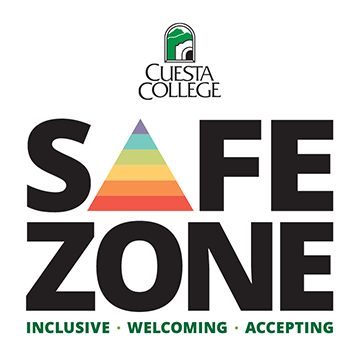Ally and Safe Space/Safe Zone Advocates
ALLY: al·ly ['alī]
Anyone who works to end oppression through support and advocacy of an oppressed group.
An example of an “ally” could be a straight cisgender* person who supports and stands up for the equality of LGBTQIAP+ people.
Campus Allies serve a critical role in Cuesta College’s mission to connect to and support the needs of a diverse student body. Our goal at Cuesta College is to work on joint efforts which includes staff, faculty, management, and students to help promote the acceptance, inclusion and celebration of multiple types of diversity.
Cuesta is committed to providing an environment which affirms human differences and similarities. The mission is implemented through examining, recognizing, and promoting diversity related to national origin, religion, race /ethnicity, gender, disability, sexual orientation, age and socioeconomic status.
the Campus Allies listed to the right are Cuesta faculty and staff members who have
completed Ally and Safe Space/Safe Zone trainings and serve as mentors for students
seeking unity and a support system on campus. There are opportunities at Cuesta to
complete similar trainings each semester.
An Ideal Ally is Someone Who
- Commits to understanding the needs of LGBTQIAP+ individuals and communities and the heterosexism they endure.
- Identifies and celebrates historical contributions of LGBTQIAP+-identified individuals, communities, and movements.
- Pursues knowledge about current policies and legislation affecting LGBTQIAP+ individuals.
- Understands that coming out is a lifelong process that demands support and celebration.
- Tries to use gender-neutral terms, such as partner or significant other, instead of gender-specific terms like boyfriend or girlfriend.
- Avoid stereotypes and makes clear that stereotypes don't represent the entire LGBTQIAP+ community.
- Confronts homophobic comments.
- Objects to homophobic jokes in all situations.
- Choose to take a position in support of human rights for LGBTQIAP+ individuals without first identifying as, “I’m straight, but …”
- Avoid expecting an LGBTQIAP+ individual to speak for LGBTQIAP+ communities.
- Acknowledges her/his/their responsibility for cultivating and producing safe and inclusive environments institutionally, politically, and socially for LGBTQIAP+ individuals
- Teaches others the importance of outreach.
- Celebrates successes in LGBTQIAP+ communities.
- Works to take action whenever possible in support of human rights for LGBTQIAP+ individuals.

